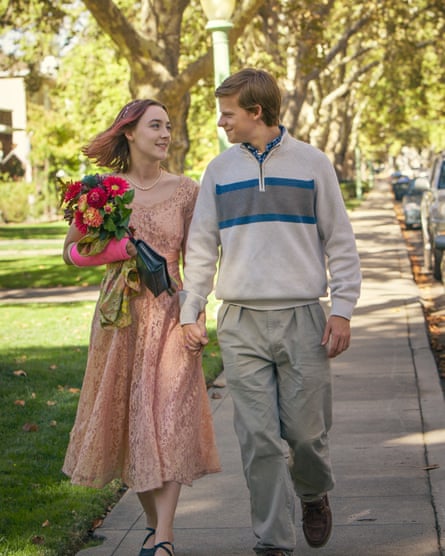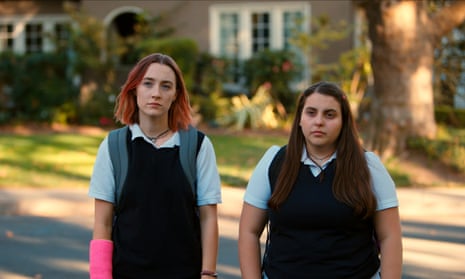Is Lady Bird the greatest film of all time? Well, if divisive critical aggregation engine Rotten Tomatoes is to be believed then yes, yes it is. Since its premiere at the Telluride film festival, the coming-of-age comedy has racked up nothing but positive notices, translating to a rare 100% rating. It then achieved the important distinction of being the most-reviewed title at this height with 170 critics sharing their love, pushing previous record-holder Toy Story 2 down to second place (it has since fallen to 99% after one controversial addition).
I’ll get it out of the way now: Lady Bird is not the greatest film of all time and while I’m at it, the Rotten Tomatoes algorithm is not the most accurate way of judging critical reception (check out the far more nuanced system at Metacritic instead). But there’s a reason so many writers have struggled to find a major problem with Greta Gerwig’s (solo) directorial debut (she co-directed 2008’s mumblecore drama Nights and Weekends). It’s not because, like with many highly ranked Rotten Tomatoes films, it’s inoffensively pleasant but it’s down to Gerwig’s almost scientific precision, tightly constructing an affecting story that doesn’t waste a word, a moment even, while never feeling like a rigid construct.

It’s Sacramento, 2002 and in her final year at a Catholic high school, the self-nicknamed Lady Bird (Saoirse Ronan) has a lot to figure out. She’s desperate to progress to a college that’s deemed worthy of her potential, ideally somewhere prestigious on the east coast, but her grades and the financial limitations of her parents are standing in the way. She’s also trying to figure out how to deal with the opposite sex, the importance of popularity among her peers and the seemingly impossible task of surviving in the same house as her mother.
In the overpopulated subgenre of autobiographical tales about growing up as an under-appreciated creative, Lady Bird stands out from its more affected counterparts by feeling thrillingly real throughout. Gerwig has managed what many writer-directors have failed to do while retelling her youth: she’s avoided self-indulgence. This is a story that feels personal yet expansive, unfiltered but necessary, timely and timeless, specific while inclusionary.
In a neatly edited 93 minutes, a running time that feels heavenly during awards season, we’re fully immersed in the world of Lady Bird. It’s a period piece but Gerwig refrains from suffocating us with nostalgia (Justin Timberlake’s Cry Me a River is a smartly inserted treat). Ronan, who’s in every scene, is a spark of energy, flitting between nerves, cockiness and temporarily life-consuming highs and lows. She’s exceptionally well-suited to the role of a Gerwig conduit and her scenes with an exceptional, awards-worthy Laurie Metcalfe, playing her hard-working mother, are electric. There’s a note-perfect encapsulation of a dynamic we’ve either been part of or adjacent to and so many scenes dragged me back to my youth, witnessing the drama of familial conflict from the backseat.
The tonal shifts of teenage life are beautifully rendered by Gerwig, her film adeptly veering between comedy and pathos within the space of a scene. There’s room for so much here, from the pettiness of high school hierarchy to the arrogance of misplaced ambition to the alarming confusion of burgeoning sexuality (one scene involving a tearful gay teen is a sudden and poignant gut-punch).
It’s been a year of desperately searching for films that somehow make a comment on the state of America and it’s a testament to Gerwig’s wonderful, heartfelt work that Lady Bird has found a place alongside more politically charged options. Regardless of age, gender or location, her story makes an indelible impact.
(Buy here)
This article contains affiliate links to products. Our journalism is independent and is never written to promote these products although we may earn a small commission if a reader makes a purchase.

Comments (…)
Sign in or create your Guardian account to join the discussion